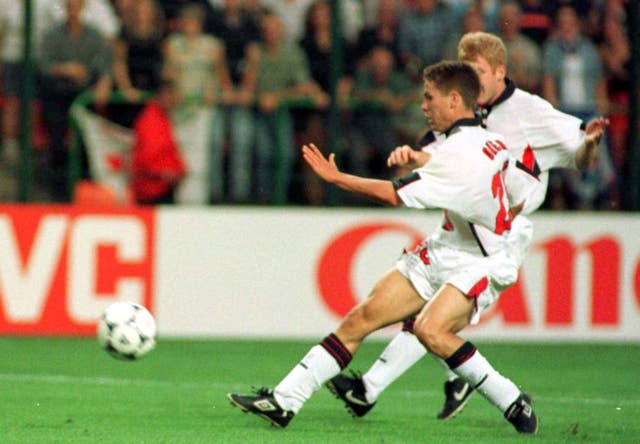
Former England striker Michael Owen announced he would retire at the end of the season on this day in 2013.
Owen, then 33, had signed a one-year contract with Stoke after leaving Manchester United the previous summer but his time in the Potteries was hampered by a hamstring injury, contributing to his decision to call it a day.
Owen scored 40 goals in 89 England appearances – then the sixth highest scorer for his country’s men’s team – and played at the top level for Liverpool, Real Madrid, Newcastle and Manchester United.

“It is with an immense amount of pride that I am announcing my intention to retire,” Owen said on March 19, 2013.
“I have been very fortunate in that my career has taken me on a journey I could only have dreamed of.
“I now feel it is the right time to bring the curtain down on my career.”
Owen burst on to the scene as a teenager at Liverpool and made England’s 1998 World Cup squad aged only 18.
His memorable solo goal against Argentina in that tournament made him a world superstar.

Owen scored 220 goals in club football, winning the Premier League, FA Cup and UEFA Cup, as well as being a three-time League Cup winner.
The peak of his club career came at Liverpool where he scored 158 goals in 297 appearances, including a late double in the Reds’ 2-1 FA Cup final victory over Arsenal in 2001 – , before moving to Real Madrid in 2004.
Owen returned to the Premier League with Newcastle in August 2005 and, after four injury-blighted years on Tyneside, moved to Manchester United on a free transfer and won his sole Premier League title at Old Trafford in 2011.
He was named European Footballer of the Year in 2001 – the first Englishman to achieve the accolade since Kevin Keegan in 1979.


Why are you making commenting on The Herald only available to subscribers?
It should have been a safe space for informed debate, somewhere for readers to discuss issues around the biggest stories of the day, but all too often the below the line comments on most websites have become bogged down by off-topic discussions and abuse.
heraldscotland.com is tackling this problem by allowing only subscribers to comment.
We are doing this to improve the experience for our loyal readers and we believe it will reduce the ability of trolls and troublemakers, who occasionally find their way onto our site, to abuse our journalists and readers. We also hope it will help the comments section fulfil its promise as a part of Scotland's conversation with itself.
We are lucky at The Herald. We are read by an informed, educated readership who can add their knowledge and insights to our stories.
That is invaluable.
We are making the subscriber-only change to support our valued readers, who tell us they don't want the site cluttered up with irrelevant comments, untruths and abuse.
In the past, the journalist’s job was to collect and distribute information to the audience. Technology means that readers can shape a discussion. We look forward to hearing from you on heraldscotland.com
Comments & Moderation
Readers’ comments: You are personally liable for the content of any comments you upload to this website, so please act responsibly. We do not pre-moderate or monitor readers’ comments appearing on our websites, but we do post-moderate in response to complaints we receive or otherwise when a potential problem comes to our attention. You can make a complaint by using the ‘report this post’ link . We may then apply our discretion under the user terms to amend or delete comments.
Post moderation is undertaken full-time 9am-6pm on weekdays, and on a part-time basis outwith those hours.
Read the rules hereLast Updated:
Report this comment Cancel